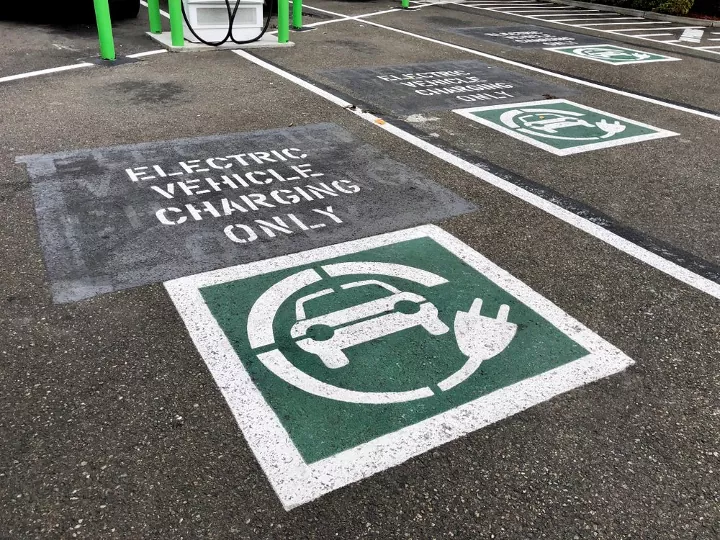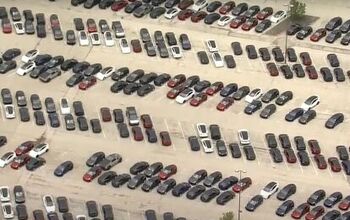Survey Shows Auto Dealers Still Annoyed With Biden EV Strategy

A recent survey, conducted by Automotive News, has indicated that automotive dealerships are still broadly dissatisfied with the Biden administration’s strategy to force the United States to pivot toward all-electric vehicles. According to the 2024 Dealer Outlook Survey, 83 percent of respondents said the government was pushing the transition toward EVs too quickly and mucking up the auto market.
The survey incorporated answers from 208 dealers and dealership managers and the majority agreed that the Biden administration had negatively affected their businesses in 2023. Roughly 55 percent also agreed that having EVs on the lot were actually generating negative interest in the lineup.
"Our roads and electric grid, let alone consumers, just aren't ready as fast as the current administration wants," explained one respondent.
Others likewise said that it should be the market driving EV sales, not pressure from the government.
From Automotive News:
A top concern was the EPA's proposed limits on vehicle tailpipe pollution for 2027-32 model-year cars and light trucks — a regulatory move that, if finalized, could result in battery-electric vehicles making up two-thirds of new-vehicle sales by 2032, according to the agency's projections.
Thousands of dealerships have urged President Joe Biden to reconsider the proposal — which could be finalized as soon as March — arguing it would mandate an unrealistic shift to solely battery-powered vehicles before the market and infrastructure are ready.
"Electric vehicles are exciting. They're definitely overall a good impact for our customers and for the environment, but it's moving too fast," said Michael Lucki, general manager of Riverhead Mazda in New York. "It should be driven by consumer demand, and consumer demand isn't there yet."
The collective dismay was probably best reflected in the question: “Is the Biden administration pushing the industry to move too fast on EVs?”
That query saw an overwhelming majority (83 percent) say yes. Only 8 percent of respondents said no, with 9 percent claiming they were unsure. About half of all dealerships also said they never bothered to register with the IRS to more easily facilitate EV tax credit exchanges. However, about half of those said they at least planned to in the future so customers could get their government refund immediately.
While the Biden administration has a stated goal of seeing half of all new vehicle sales by electric by 2030, it’s technically prohibited from issuing formal mandates requiring what people can use their money to buy. However, it can encourage federal regulators to implement policies so rigid that the industry is required to build EVs in greater numbers and that has been its preferred tactic.
As you undoubtedly know, the automotive sector has spent the last few years patting itself on the back for going along with the scheme and similar programs implemented in Europe. Electric automobiles have, for whatever reason, been framed as a moral good by both industrial and government actors. But the public has remained broadly hesitant to climb aboard the bandwagon as the downsides of EV manufacturing became more apparent.
The industry has likewise had trouble fielding electric vehicles with broad appeal. Luxury-minded electrics are simply too expensive for most people to afford and the more pedestrian models have been seen in the news for battery fires and botched product launches. Some of that is undoubtedly the result of the media landscape trying to draw in eyes. But it’s being reflected in slowing sales, as the electrified segment looks to be approaching market saturation.
That said, sales volumes haven't been great in general and quality control looks to have gone down across the board since 2019. Combustion and electrified vehicles have both seen a drop in consumer satisfaction. Meanwhile, inflationary pressures, caused by excessive government spending and plain-old corporate greed, are forcing average buyers downmarket.
As for dealers, there’s some amount of disagreement as to what’s holding EVs back. Some have argued it’s simply a lack of infrastructure, while others have claimed battery driven vehicles simply don’t work as well for the typical customer. Many stores also don’t want to shell out large sums to refit their facilities in the manner some automakers claim would be mandatory if they want proper EV allocation.
Rising MSRPs were also a concern, with many noting EVs tend to trade at prices far higher than their combustion-driven counterparts and are likewise worse at holding their resale value. That issue was exacerbated by provisions (e.g. Section 30D) issued by the federal government designed to help localize electric vehicle production and ensure wealthy shoppers (who tend to buy more EVs) weren’t being overly advantaged. There are ironically fewer vehicles that actually qualify for government subsidies now than when the U.S. still used production quotas.
"EVs are definitely not a want of our guests today. Who's going to pay that kind of money for that type of vehicle when the infrastructure isn't available?" stated Mike Aus, dealer principal of Durango Motor, which sells Ford, Lincoln, Kia and Toyota vehicles out of Colorado. "Until the prices of them come in line with normalcy, they're going to continue to sit there."
[Image: ZikG/Shutterstock]
Become a TTAC insider. Get the latest news, features, TTAC takes, and everything else that gets to the truth about cars first by subscribing to our newsletter.

A staunch consumer advocate tracking industry trends and regulation. Before joining TTAC, Matt spent a decade working for marketing and research firms based in NYC. Clients included several of the world’s largest automakers, global tire brands, and aftermarket part suppliers. Dissatisfied with the corporate world and resentful of having to wear suits everyday, he pivoted to writing about cars. Since then, that man has become an ardent supporter of the right-to-repair movement, been interviewed on the auto industry by national radio broadcasts, driven more rental cars than anyone ever should, participated in amateur rallying events, and received the requisite minimum training as sanctioned by the SCCA. Handy with a wrench, Matt grew up surrounded by Detroit auto workers and managed to get a pizza delivery job before he was legally eligible. He later found himself driving box trucks through Manhattan, guaranteeing future sympathy for actual truckers. He continues to conduct research pertaining to the automotive sector as an independent contractor and has since moved back to his native Michigan, closer to where the cars are born. A contrarian, Matt claims to prefer understeer — stating that front and all-wheel drive vehicles cater best to his driving style.
More by Matt Posky
Latest Car Reviews
Read moreLatest Product Reviews
Read moreRecent Comments
- TheMrFreeze The American auto industry is the last large vestige of our once great industrial power...a nation like ours NEEDS industrial power of this type to survive. Case in point, at the beginning of the pandemic, when PPE and ventilators were desperately needed and our only source was China, it was the US automakers who quickly pivoted to start manufacturing them. No other industry in this country has the skill or manufacturing capabilities to do that.When you take this into consideration, plus the fact that Chinese automakers are financially supported by the CCP while US automakers function as fully free market entities, I have zero problem with a huge tariff being placed on Chinese vehicles to level the playing field. I do think, however, that the government then has the right to "remind" the Big 3 that it's now up to them to provide the affordable vehicles to fill the void the Chinese would have filled.
- Fahrvergnugen Don't knock the Chinese so loudly. They are listening, and reading everything, keeping Naughty and Nice lists.
- Redapple2 2026 f1 cars. Even more crappie! Tune in!F1 is crap. Garbage racing.1 must use 2 types of tires2 cant refuel3 DRS - only in certain places. in certain situations. on certain days of the week. and.... 4 same team wins 90% of races.Go IMSA !!!! or Moto GPPS- Historic Monaco races last weekend were spectacular. All 10 hr on TV.
- Redapple2 volume meets or exceeds expectations......................... But, they always give you high annual volume to quote so they get a cheaper price. You have to tool up to that volume (costing you extra$) because if that part number reaches that volume and you cant meet it? Whao unto you. After getting burned by gm 10 yrs ago, we moved to heavy truck and agriculture products only. Steady volumes. More profits. 30 net payment. The vampire is up to 90-120 days now? Never big 3 work. Ever !
- Tedward I was hypothetically annoyed about this until it happened to my wife. Watching her face twist into disbelieving rage once she realized that gm had sold her data to an insurance company after buying a very nice Cadillac was an eye opener though. If anyone wants a peek at the reputational damage done look at her. GM turned a manual BW purchase (and she's head over heels in love with it) into a non event as far as recos and future purchase considerations go. That's a heavy lift. I mean, she'd buy another manual BW, but there's zero talk about gm cars in general coming from her, in stark contrast to her VW love while she had her gti.

































Comments
Join the conversation
"They should first electrify that border wall."
I kinda got a chuckle out of that meme.
if it were up to the luddites we'd still ;;;
have leaded gas
no seat belt laws
smoke on airplanes
don't let women vote
as it is dealerships and 'top salespeople' are the literal scum of the earth so NFG, go cry all you want dealers ...